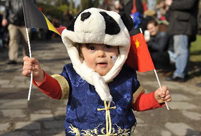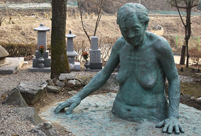 Fighters of Lanzhou MAC in confrontation training
Fighters of Lanzhou MAC in confrontation training
 3D printing to trigger third industrial revolution
3D printing to trigger third industrial revolution
 Top 10 brands that win rich women's hearts
Top 10 brands that win rich women's hearts
 Deng Xiaoping: 'I have a clear conscience all my life'
Deng Xiaoping: 'I have a clear conscience all my life'
 Xi Jinping: 'The people are our strength'
Xi Jinping: 'The people are our strength'
 Amazing cliff diving in cold winter
Amazing cliff diving in cold winter
 Enjoy Sochi 2014 in slow motion
Enjoy Sochi 2014 in slow motion
 University student sentenced to death for poisoning roommate
University student sentenced to death for poisoning roommate
 Chinese lunar New Year celebrated in San Francisco
Chinese lunar New Year celebrated in San Francisco
BEIJING, March 6 -- International scholars at a conference held in Shanghai on the science of learning suggest an easier, more active way for children to learn a second language than traditional rote memorization in a classroom.
The answer lies in informal learning environments where students not only connect with real life but connect with it in more than one language.
English courses in China have long been criticized for what has been characterized as their dried-up teaching methods and absence of practical application.
Yet studies show that about 81.5 percent of a person's life is spent in informal learning environments. With that in mind, language learning should not be limited to a formal classroom or to a single language, the experts say.
"They should learn English through more active communication, rather than focusing on vocabulary and grammar. It is a way to learn multiple languages," said Dirk Van Damme, head of the innovation and measurement division of the education directorate of the Organization for Economic Cooperation and Development in Paris.
"The ability to speak and communicate is very important. And bilingualism can help stimulate the development of the brain. Chinese students - at least those in Shanghai - are very capable in their second-language learning," Van Damme said.
Exposing children to a bilingual environment through informal study is important, said Cheng Kai-ming, a professor of Education at the University of Hong Kong.
"Learning has always been an essential part of human life," Cheng said. "Now we are living in a society with rapid changes, one that is already substantially different from the typical manufacturing base of the past. Therefore, it's prime time to reinterpret learning."
Another expert also saw the value of bilingual learning but offered a caveat.
"The human brain has a remarkable ability to reorganize its structures in response to differences in environmental and behavioral experience, such as educational, social and multicultural learning, or monolingual versus bilingual language learning," said cognitive neuroscientist Laura Ann Petitto, science director of the National Science Foundation's Science of Learning Center.
Bilingual exposure at an early age will produce some positive effects for a child's growth and learning ability, especially in the area of reading. But she also warned that if a child is exposed to two languages or two reading systems simultaneously, it may cause language delay and confusion.
In an academic report, Bilingualism Alters the Brain's White-Matter Microstructure, Patricia Kuhl, a professor at the University of Washington, said that children in bilingual environments demonstrate higher cognitive ability. Experiments showed, for example, that children in a bilingual environment can get toys into a box more quickly than their single-language peers.
In December, the Ministry of Education released a draft reform plan for the national college entrance examination, or gaokao, making it clear that English will be moved from the exam in the future. Provinces and cities across the country are required to work out their own plans under the direction of the ministry.
So far, many regional gaokao reform plans across the country remain undeveloped, but debate continues to swirl about how English is taught.
 Chaihe village, pure and peaceful fairyland in snow
Chaihe village, pure and peaceful fairyland in snow Belgians warmly welcome arrival of China's giant pandas
Belgians warmly welcome arrival of China's giant pandas Female marines receive tactical training in NW China
Female marines receive tactical training in NW China Blood memory: Nanjing Massacre in 1937
Blood memory: Nanjing Massacre in 1937 Top 10 pure beauties in showbiz
Top 10 pure beauties in showbiz British WWII veteran: I can't forgive Japan
British WWII veteran: I can't forgive Japan Tongban's dream of prosperity
Tongban's dream of prosperity Chinese frigate Yancheng holds drills in Mediterranean Sea
Chinese frigate Yancheng holds drills in Mediterranean Sea A visit to comfort woman's home in South Korea
A visit to comfort woman's home in South Korea Fairyland? Qingdao in sea of clouds
Fairyland? Qingdao in sea of clouds Top 10 most handsome faces in Asia in 2013
Top 10 most handsome faces in Asia in 2013 Female celebs with beautiful long legs
Female celebs with beautiful long legs Cat 'guardians' in Forbidden City
Cat 'guardians' in Forbidden City Large numbers of ancient coins excavated in Inner Mongolia
Large numbers of ancient coins excavated in Inner Mongolia Leisurely life beneath Zhonggulou, where time travels slower
Leisurely life beneath Zhonggulou, where time travels slowerDay|Week|Month